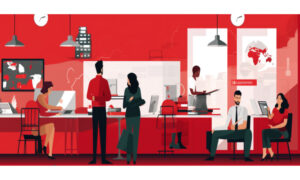Establishing a change-ready mindset in business
- 5 Min Read
How can People Leaders get their colleagues in the right mindset for growth from the get-go? Colin D. Ellis, author of ‘Culture Fix: How to Create a Great Place to Work’, investigates.
- Author: Colin D. Ellis
- Date published: Nov 8, 2019
- Categories

Change and transformation are topics that organisations talk about a lot. But, in general, business aren’t very good at either. A recent SAP survey found that of the 84% of organisations that had started transformation initiatives in the last year, only 3% had actually successfully completed any.
One of the reasons for this is that senior managers get too excited when they’re pulling their business plans together about smarter, faster ways to do things. They forget that, in order to achieve this, they have to stop doing some things and redefine the way they get things done, to help others to develop the change-ready mindset required to transform.
Cultural evolution – the process by which employees decide to act and behave differently – is frequently cited as the biggest enabler of successful change; yet very few organisations ever take it on, choosing instead quick-fix training solutions, restructures or funky office fit-outs.
However, every project undertaken – regardless of the method used to deliver it – provides an opportunity to help people to develop the mindset required to move from one cultural state to another. You could be opening a new office, implementing a new policy or upgrading a technology system. Whatever it is, there’ll be something new or different to use at the end and people have to be ready for it.
To successfully prepare your business and people for change you need to get a few things in place:
A sound business case for change
This will answer the ‘Why this? Why now?’ questions and provide a foundation on which the activity required to deliver the change can be built. People are much more likely to adopt a change-ready mindset if they understand the case for change.
Public accountability
A senior executive within the business who is prepared to throw their reputation and effort behind the activity and to ensure it delivers what was promised in the case for change. This public accountability role models the mindset and actions required of others within the culture.
A strong team
Built at the start of the project, the team works collaboratively to deliver value (as outlined in the case for change) as quickly as is possible to satisfy the customer need. Often the culture is determined by the prevailing mindset in the business, so by establishing a strong team with values lived in the open a message of optimism and change-readiness is established.
A strong vision and definition of the future state
To motivate and inspire the team and ensure that those using the outputs from the initiative understand what’s required of them and to help people shift from the familiar to the new. A good vision statement becomes an inspiration to achieve the aspiration.
Clear unambiguous communication
Not just about the activities required to complete the initiative, but also on the personal change required to achieve success. Telling people to be change ready doesn’t work, however, communicating the nature of the change, the reasons for it and demonstrating how senior managers are doing their bit to lead the way, it acts as a motivation to change.
Underpinning all of these human activities is the need for high emotional intelligence and a growth mindset and for too long we’ve downplayed the importance of these. In our continued rush to do more, the requirements of and impacts on people continue to be underestimated or simply not considered at all.
If people don’t believe in the change, aren’t involved in it, don’t feel part of it or simply don’t understand it, it will fail. Similarly, if people get in the way of change and there’s no consequence for doing so, it will fail.
And here’s where great change managers add the most value.
They understand that cultural evolution requires a different level of energy and actively lead the team building work (with a change-ready mindset) at the beginning of the initiative to ensure it starts with the right intention.
They work closely with those accountable and responsible for delivery and ensure that messages are delivered in a way that stakeholders understand.
They help people move away from the familiar to the often uncomfortable ‘new’ way of doing things. In short, they help people to develop their change-ready mindset.
They coach, mentor and remind people of the cultural evolution that’s required. They hold them to the required behaviours and ensure the right path is followed for those trying to stand in the way. They are realistic optimists and help people to see the positives, rather than telling them to be positive. They are empathetic, honest, trustworthy, disciplined, resilient and they build influence across an organisation.
Any kind of change requires a different mindset from those who have an impact on it or impacted by it. With the right preparation and role modelling from senior managers, change becomes much easier and the culture will evolve to meet the challenges of the future, not the past.
Colin D Ellis is a culture change expert, an award-winning international speaker and a best-selling author. His latest book ‘Culture Fix: How to Create a Great Place to Work’ (Wiley £15.50) has seen him travel all over the world to help organisations transform the way they get things done. For more information about how Colin can help your team visit www.culturefix.xyz








